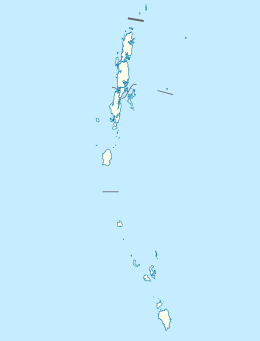Viper Island
| Geography | |
|---|---|
| Location | Bay of Bengal |
| Coordinates | 11°39′40″N 92°41′49″E / 11.661°N 92.697°ECoordinates: 11°39′40″N 92°41′49″E / 11.661°N 92.697°E |
| Archipelago | Andaman Islands |
| Adjacent bodies of water | Indian Ocean |
| Total islands | 1 |
| Major islands |
|
| Area | 0.335 km2 (0.129 sq mi) |
| Length | 0.88 km (0.547 mi) |
| Width | 0.50 km (0.311 mi) |
| Coastline | 2.7 km (1.68 mi) |
| Highest elevation | 0 m (0 ft) |
| Administration | |
| District | South Andaman |
| Island group | Andaman Islands |
| Island sub-group | Port Blair Islands |
| Tehsil | Port Blair |
| Largest settlement | Viper Island (RV) |
| Demographics | |
| Population | 0 (2011) |
| Pop. density | 0.00 /km2 (0 /sq mi) |
| Additional information | |
| Time zone | |
| PIN | 744202 |
| Telephone code | 031927 |
| ISO code | IN-AN-00 |
| Official website | www |
| Literacy | 84.4% |
| Avg. summer temperature | 30.2 °C (86.4 °F) |
| Avg. winter temperature | 23.0 °C (73.4 °F) |
| Sex ratio | 1.2♂/♀ |
| Census Code | 35.639.0004 |
| Official Languages | Hindi, English |
Viper Island is an island of the Andaman Islands. It belongs to the South Andaman district of the Andaman and Nicobar Islands.
The island lies 4 km (2 mi) west of Port Blair.
Viper Island derives its name from the vessel H.M.S. Viper in which Lt. Archibald Blair came to Andaman and Nicobar Islands in 1789. The vessel, it is believed, met with an accident and its wreckage was found near the island. This small island was the site of the jail where the British used to imprison convicts and political prisoners. It has the ruins of a gallows atop a hillock.
The jail was abandoned when the Cellular Jail was constructed in 1906. In any talk about Andaman and its role in the freedom struggle, it is the Cellular Jail that finds frequent mention. But, many years before the Cellular Jail was constructed, it was the jail at Viper Island that was used by the British to inflict the worst form of torture and hardship on those who strove to free the country from the British rule.
The need for building a jail there was felt only after the British set up a penal settlement at Port Blair in 1858 to house political prisoners of the Indian Rebellion. Ross Island functioned as the headquarters of the penal settlement. Located near Port Blair, the construction of the Viper Jail was carried out during 1864–67. Lt. Col. Barnet Ford, the superintendent of the Penal settlement, supervised the work. Initially, a police inspector, a head constable, two sergeants, four class I constables and 30 class II constables were posted. Later on, the strength was raised gradually. Solitary cells, lock-ups, stocks and whipping stands characterized the Viper Jail. Women were also held.
The conditions at the jail were such that the place got the notorious name, "Viper Chain Gang Jail". Those who had challenged the might of the British authority were chained together and confined at night by a chain running through coupling of irons around their legs. It was at this jail that members of the Chain Gang were put to hard labour. Brij Kishore Singh Deo, popularly known as Maharaja Jagannath of Puri, was kept in the Viper Jail, where he died in 1879.
...
Wikipedia

